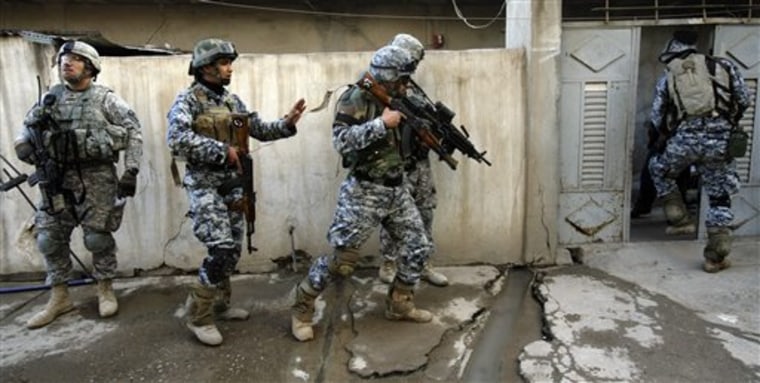A gunman wearing an Iraqi army uniform opened fire on a U.S. military team Saturday, killing two American soldiers and wounding three others at a combat outpost in northern Iraq, the military said.
A military statement said the attacker was killed after the ambush-style assault 12 miles south of Mosul, which is one of the last urban strongholds for Sunni insurgents.
In the past, attackers have used military and police uniforms to bypass checkpoints and gain access to heavily guarded bases. But Iraqi military officials said the gunman was an Iraqi soldier who also served as a Sunni Muslim preacher for an army unit.
The officials spoke on condition of anonymity because they were not authorized to speak to the media.
The attack will likely elevate worries about militant infiltration in Iraqi security forces as the U.S. military turns over more responsibilities in a phased withdrawal before all American forces leave at the end of 2011.
It also could be one of the few confirmed cases of a member of Iraq's security forces targeting U.S. troops. On Feb. 24, two Iraqi police officers in Mosul opened fire on a visiting U.S. military team, killing one American soldier and an interpreter. The gunmen remain fugitives.
Earlier this week, a U.S. military spokesman, 1st Lt. John Brimley, called the February shooting "definitely an anomaly."
The attack follows the deadliest month for U.S. troops in Iraq since September — with 18 American soldiers dying in Iraq in April.
Bombing foiled at Shiite mosque
In the northern city of Kirkuk, security patrols were boosted after an attempted suicide bombing Friday was foiled by guards at the last moment at a Shiite mosque.
Authorities identified the would-be attacker as a Syrian teenager who they believe was recruited by al-Qaida in Iraq. The suspect — 19-year-old Ammar Afif Hamada — was tackled on the doorsteps of the mosque while it was filled with worshippers.
The dramatic capture was welcome good news for Iraqi authorities after a spike in blasts by suspected Sunni insurgents that have claimed more than 200 lives since late April and raised question about the durability of recent security gains.
It also could offer investigators insights into insurgent operations in northern Iraq and smuggling routes from Syria — long considered one of the main pipelines to replenish insurgent ranks from across the region.
According to a police officer involved in the investigation, Hamada fired a pistol at one guard who tried to stop him. Then another guard tackled him as he continued toward the mosque's main hall, grabbing the attacker's hands to prevent him from detonating an explosives belt packed with grenades and connected to a trigger in the suspect's digital watch.
The officer spoke on condition of anonymity because he wasn't authorized to release the information.
Hamada traveled from Syria to the northern city of Mosul about a week ago, then arrived Wednesday in Kirkuk, where he was moved from safe house to safe house in mainly Sunni areas, the police officer said.
Kirkuk police chief Maj. Gen. Torhan Abdul-Rahman Youssef confirmed the details and said Hamada has been an al-Qaida operative in Iraq for the past four years and has confessed to participation in many operations in Diyala province and Baghdad.
Hamada, meanwhile, was being treated for serious head injuries at a hospital in Kirkuk after being beaten by guards and worshippers at the scene, police said.
Volatility in Kirkuk
Tensions have risen in Kirkuk as Kurdish leaders seek to incorporate it into their semiautonomous area, making it one of the most politically sensitive issues for Iraqi leaders and for U.S. military commanders preparing to withdraw their troops by the end of 2011.
The showdown is so volatile that Kirkuk was excluded from regional elections in January and the United Nations has offered a proposal for compromise plans.
U.S. Defense Secretary Robert Gates, speaking on CNN's "Fareed Zakaria GPS" in a segment to air Sunday, described Kirkuk's ethnic rifts as one of Iraq's most complicated puzzles.
"From an Arab-Kurd point of view, Kirkuk is a bigger problem by far than Mosul," he said. "Mosul is really still a security problem from the standpoint of al-Qaida is still using that as kind of their last redoubt, if you will. But, you know, I think (the Iraqis) will continue to work these things through."
